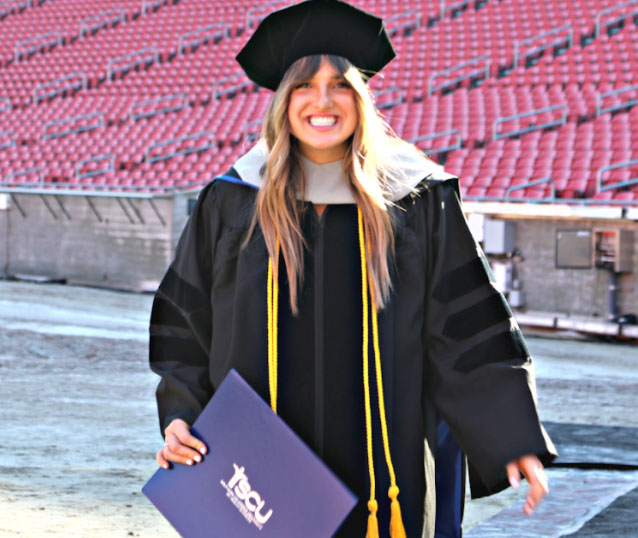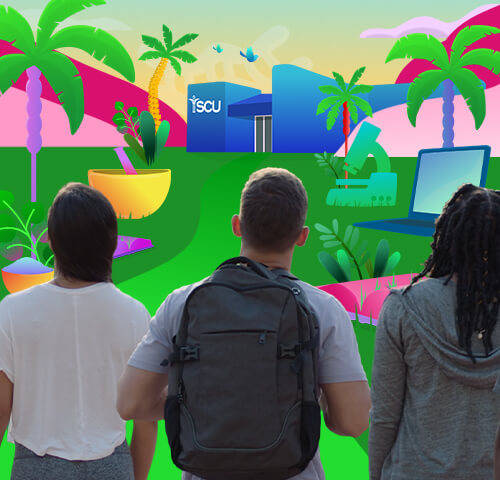Speak with an admissions advisor. 562-475-4604
Speak with an admissions advisor. 602-887-5780
Speak with an admissions advisor. 562-580-0525
![]()
![]()

“In many ways, human health is the great global connector.” Kathleen Sebelius, former United States Secretary of Health and Human Services. The world is smaller today. People regularly go beyond borders to expand opportunities. SCU's passion for preparing future healthcare providers to thrive in a connected, interprofessional, and global society inspires us to offer a variety of international and cross-cultural experiences.
Connect with American culture at a university where education is fueled by forward-thinking modern Western practices, yet rooted and grounded in ancient Eastern techniques. At SCU, we respect and celebrate the cultural diversity of our students and we are excited to welcome you! Our education programs are built around collaboration.
SCU, an American University located in Southern California, has welcomed healthcare students from over 30 countries around the world, including Armenia, Belgium, Canada, China, Cuba, Egypt, Great Britain, Guatemala, Hungary, India, Iraq, Iran, Italy, Japan, Kenya, South Korea, Lebanon, Mexico, Malaysia, Nigeria, Peru, Russia, Sweden, Slovakia, Thailand, Tonga, Turkey, Taiwan, Venezuela, and Viet Nam.
SCU offers part-time on-campus employment opportunities for students, based on position availability and skill requirements. You earn a paycheck as you work, which helps cover expenses and reduce your total borrowing. SCU’s Designated School Officials (DSO) in the Student Services Office can provide details on work-study opportunities.
Blyss, Doctor of Chiropractic student, Montreal, Canada
Optional Practical Training (OPT) is a benefit for students on F-1 visas. It allows students to work off-campus in a job directly related to their major field of study. The purpose of OPT is for students to apply the knowledge and skills gained in the classroom to practical work experience in the U.S.
Graduate students are permitted by the United States Citizenship and Immigration Services (USCIS) to work for one year on a student visa towards getting practical training to complement their education.
SCU students are only eligible for Post-Completion OPT after they have completed their degree. The employment available to them while pursuing their degree is on-campus employment and does not require OPT approval. Any off-campus clinical experience is considered coursework and does not require work authorization.
Completion of studies is defined as the actual date that you complete all requirements for a program of study (such as the date of your final exams, or submission of your thesis or dissertation). It is not automatically considered to be the date of graduation ceremonies.
SCU campus Designated School Officials (DSO) assists students with OPT by reviewing the application process and providing the required work authorization recommendation on their I-20s. The OPT application is processed by U.S. Citizenship & Immigration Services (USCIS). Processing time can take up to 5 months, so it is important to apply early. USCIS allows students to apply for OPT up to 90 days before program completion. Students may apply for OPT before receiving a job offer.
SCU welcomes applications from qualified students from other countries. The general admission requirements are identical for all applicants, regardless of citizenship. However, immigration regulations, varying educational backgrounds, and financial considerations require additional procedures necessary for international students. The only programs that are eligible for an I-20 are the Doctor of Chiropractic and Acupuncture and Chinese Medicine degrees.
For visa purposes, international students must provide a foreign address in the Application for Admission. International applicants who are admitted to SCU will receive a visa information packet along with the acceptance letter from the Office of Admissions. International students are encouraged to allow adequate time to fulfill the requirements.
Students seeking additional information regarding studying in the states should visit the Department of Homeland Security Study In The States website.
The ability to speak, read, and understand English fluently is an important factor in admissions decisions. Students must be able to provide one of the following:
Applicants whose highest degree is from a foreign high school, college, or university must have their credentials evaluated to demonstrate that the courses or degree earned meet the admissions standards. The University will accept evaluations by an agency listed on the National Association of Credential Evaluation Services (NACES) website.
Canadian students are not required to have their credentials evaluated by NACES if their high school, college, or university provides transcripts in English and are sent directly to SCU.
For students seeking an F-1 Visa, provide all necessary documentation for issuance of an I-20: Certificate of Eligibility for Nonimmigrant (F-1) Student Status including:
All international students must submit proof of health to the Office of Student Services within 30 days of matriculation. Proof of health must be issued by a licensed U.S. physician or other qualified medical authority verifying freedom from tuberculosis.
International students will need to abide by all U.S. travel and entrance requirements tied to COVID-19 vaccination or other public health standards. Please see the information below for details and be sure to check sources frequently for any updates.
Admission advisors are dedicated to helping you, and they are a phone call, text, email, or virtual meeting away—so ask all your questions!
Top reasons to connect:
SCU offers payment options to assist our students and families whose balances are not fully covered by financial aid. Currently, we offer a Full Payment Plan and a Monthly Payment Plan. With the Full Payment Plan payment of tuition and fees is due by the Friday of the second week of each term. The Monthly Payment Plan option breaks up the balance due into four equal installment payments over the course of the term. Students who are interested in the Monthly Payment Plan must enroll at the beginning of each term by the Friday of the second week of the term and are required to make their first installment payment at that time. There is a $50 fee to participate in this option, which is also payable upon enrollment. Students can self-enroll in a monthly payment plan on the Student Account page on the mySCU portal.
SCU currently accepts credit card payments online via mySCU as well as payment by check, cashier’s check, or money order. SCU currently accepts payment by ACH (e-check),credit card (additional fees apply) and international funds transfer online via mySCU as well as by check, cashier’s check or money order.
The Office of Student Accounts welcomes any questions a student may have about their student statement, billing, or payment arrangements. You may contact us by calling 562-947-8755 Ext. 760, or via email at StudentAccounts@scuhs.edu
Our largest international population is Canadian students. Southern California provides a great opportunity to experience a different climate while developing new skills and friends. SCU has many Canadian graduates and faculty currently teaching on campus.




SCU is an approved international school that Canadian students can receive funding. Most of our Canadian students pay for their program through a mixture of federal and provincial aid, a line of credit, scholarships, and on-campus student employment. Types and amounts of aid vary by province and academic program. SCU’s Financial Aid Office can assist you in meeting your financial obligations and encourages you to meet with a financial aid counselor early in the admissions process to discuss your financing options. Talk with a financial counselor by calling (562) 947-8755 ext. 766.
SCU’s Canadian Scholarship is for F-1 Visa Canadian students who are enrolled in the Doctor of Chiropractic program and provides a maximum of a 20% discount on tuition. Students must be continuously enrolled full-time, maintain a minimum cumulative GPA of 2.5, remain in good academic and conduct standing, and adhere to all student rights and responsibilities as outlined in the University Catalog.
This scholarship is automatically provided to those who qualify with no application required and is subject to modification based on quarterly reviews by the university.
SCU offers additional scholarships and assistance to students with high academic standards and/or financial needs. Please review the scholarships and assistance opportunities at SCU Scholarships.
Students are eligible to apply for aid from Canada while attending SCU. Interested students will need to contact specific provinces to identify the appropriate application to qualify for federal and/or provincial financial aid.
Available Resource Links:
Canadian students apply for student aid each year by completing an application online through the student financial assistance website of your home province or territory. Application forms should be submitted by March 1 of each year for priority processing. In addition, some Canadian students elect to access a student line of credit from a Canadian bank. Some lending institutions may offer loan funding specifically for your program of study.
Students can work with the Canadian Imperial Bank of Commerce (CIBC), RBC Royal Bank, or other banks for a line of credit. A personal line of credit may help ease the financial burden. Vancouver CIBC advisors can work directly with students or refer business to another CIBC Banking Centre based on the student’s preferred location. Click here to view a PDF list of CIBC Financial Advisors by Province.
In terms of immigration regulations, the only difference between Canadians and other international students coming to the United States is that Canadian citizens do not require an application to a U.S. consulate or embassy for an entry visa.
Canadian students are still subject to the same regulations regarding employment in the United States, the requirement for full-time study, and all other provisions for maintaining F-1 visa status. It is especially important for Canadians to be vigilant about entering the United States in proper F-1 visa student status, as immigration inspectors are accustomed to admitting Canadian citizens as tourist visitors.
At the port of entry, Canadian students must present their passport, I-20 document, SEVIS fee receipt, and supporting financial documentation to the immigration inspector to be admitted into the U.S. in F-1 status.
You will be given an I-94 Admission/Departure card to complete. Be sure to look at your I-94 card before you leave the inspection area to ensure that it has the notation “F-1, D/S” written on it. Canadian students must have an I-94 card to confirm their current F-1 status. If not, you are in Visitor (B-2) status, a status that does not permit study in the U.S. If your Port of Entry is no longer issuing physical I-94 cards, you can verify your I-94 number and visa status through this attached link.
You must read about and abide by all provisions relating to F-1 status.
To qualify for an F-1 visa, students need to be accepted into an approved program at a Student and Exchange Visitor Program (SEVP) certified school and must meet U.S. Citizenship and Immigration Services (USCIS) guidelines to enter the United States under F-1 student status.
Students who have been offered acceptance into the Doctor of Chiropractic program will receive instructions from the SCU Office of Admissions on how to obtain an I-20. The form I-20 “Certificate of Eligibility for Nonimmigrant Student Status” is an official document provided by the SCU’s Primary Designated School Official (PDSO) and is required for all international students to apply for an F-1 student visa and to enter the United States.
Your I-20 will be issued to you after the campus DSOs receive and review your LACC Financial Visa form, a copy of your passport, evidence of sufficient financial support, and health insurance. These documents need to be completed and returned to SCU electronically via email, by express, or regular mail. Sufficient financial support is equivalent to the cost of one academic year at SCU which includes tuition, books, fees, housing, and miscellaneous costs. Refer to your specific program and the LACC Financial Visa form for cost details.
Proof of financial support may be demonstrated through a combination of any of the following:
After the I-20 document is issued, all foreign students applying for F-1 status are required to pay a SEVIS fee of $350 USD This fee is paid directly to the U.S. government through this website link. Once the fee is paid, you will need to print your receipt as proof of payment is required before going to the U.S. consulate for a visa interview and is also required when crossing the border into the United States. Please note that Canadian citizens do not need to visit a consulate for an interview. Your F-1 visa status will be processed at the port of entry.
USCIS regulations allow F-1 students to enter the United States with an issued I-20 document and SEVIS payment receipt no earlier than 30 days before the program start date. You will find the Earliest Admission Date listed on your I-20.
All international students in valid F-1 student status are granted certain privileges and are subject to certain federal requirements and restrictions on activities. It is the student’s responsibility to understand these regulations and to maintain student status.
For more information, please visit the U.S. Department of Homeland Security Study in the States website.
Nonimmigrant, non-US nationals should also be aware of vaccination and negative COVID test requirements for all individuals entering the United States. Up-to-date information can be found at the CDC website.
Once you enter the United States, you are required to meet with the SCU PDSO to complete your SEVIS registration.
U.S. financial institutions are required to verify the identity of every individual who opens a bank account. In compliance with federal regulations, all banks operating in the U.S. have established Customer Identification Programs (CIP) for anyone who seeks to open an account. The information that the banks must obtain from international students before opening an account are:
It is important to remember that banks establish their own customer identification programs and may ask for additional documentation than what is described above.
Documents to bring to open an account:
Your admissions advisor may provide you with a letter to the bank confirming your status at Southern California University of Health Sciences and asking for their assistance in opening your account.
Some Canadian banks offer US/Canada cross-border banking services. Check with your branch for availability.
Taxpayer Identification Numbers
Banks are required to report any earnings they receive on interest earned on your account. For this reason, bank representatives will ask for a taxpayer identification number, such as the Social Security Number (SSN) issued to those who work, or the Individual Taxpayer Identification Number (ITIN) issued by the Internal Revenue Service to those individuals who are not eligible for an SSN. Although the banks prefer that you already have one of these numbers, you can still open a bank account if you do not have one.
If students are eligible for a SSN, it is recommended to apply for one as soon as possible. Additionally, international students are eligible for a SSN if they have a work-related, nonimmigrant status such as H-1B, TN, R-1, J-1, or are an F-1 student approved for curricular practical training, optional practical training, or have secured on-campus employment. If students have applied for the SSN before opening a bank account, they should take a copy of the receipt notice. The receipt notice may serve as additional documentation that can help establish identity. As soon as a student receives an SSN, they should inform the bank.
If students are not eligible for a SSN, apply for an Individual Taxpayer Identification Number and once it is assigned, inform the bank of this number.
F-1 students who are not employed are not eligible for an SSN and must apply for an ITIN through the IRS instead.
ITIN application procedures require that students present evidence of ownership of an interest-bearing bank account. Students cannot obtain an ITIN until establishing a bank account.
After submitting the ITIN application, it will take the IRS approximately four to six weeks to assign a number. If the bank account does not pay any interest, then students must wait to file for the ITIN when filing the required tax forms in April. Visit the IRS website for more information.
Canadian students usually take the Canadian and the U.S. board exams to become licensed in both countries, allowing practice in either country. Your choice will depend on where you see yourself practicing once you graduate, and beyond. As a Canadian student at SCU, you will have the option to take the U.S. board exam on campus during your time here.
SCU students consistently score high on the Canadian Board Exams. SCU offers Canadian chiropractic students board prep materials for students heading back to take the exam. There are three components to the exam. Canadian students are responsible for scheduling and traveling to take each exam (locations and dates are on the CCEB website).
Chiropractic, like medicine and dentistry, is a self-regulating profession. Each U.S. state and Canadian province has unique requirements for licensure as well as scope-of-practice regulations and malpractice insurance requirements. An early understanding of these requirements will be invaluable to you as you prepare for your future career.
Licensure requirements include:
The SCU Doctor of Chiropractic program is designed to offer students education sufficient for licensure in all U.S. states, Canadian provinces and territories, and other foreign jurisdictions. Our graduates practice successfully across the country and internationally.
Additional resources regarding licensure and the chiropractic profession are available from the following:
All SCU students receive free chiropractic care and discounted health and counseling services including counseling, diagnostic imaging, labs, and more.
Health coverage for international students is typically secured through each province and SCU Admissions Advisors recommend talking with insurance carriers about a rider. For those seeking coverage outside of current plans, it is possible to purchase travel insurance through auto insurance plans.
SCU’s Student Housing in partnership with National Corporate Housing would like to welcome you to Pinnacle at Fullerton Apartments located just 7.8 miles from campus. Through our partnership with National Corporate Housing, our housing provides fully furnished apartments complete with all the amenities and comforts of home, including linens, towels, utilities, and WiFi. Residents benefit from 24/7/365 guest services, ensuring consistent and caring communication with a personalized experience. This enriching environment allows you to thrive academically and personally while forming lasting friendships with students from various programs. We look forward to welcoming you and supporting your journey at SCU!
Nestled between Los Angeles and Orange County, SCU’s location near one of the largest and most diverse metropolitan areas in the world provides an elevated educational and living experience. The SCU campus has many facilities available including a gym, café, bookstore, and the University Health Center. The campus is located 20 minutes from Disneyland and 40 minutes from the beach.
International students including Canadians under F-1 visa status are eligible to work on campus up to 20 hours per week.
On-campus positions that are open to international students include student tutor, admissions assistant, continuing education assistant, operations assistant, and media services assistant. mySCU contains a comprehensive list of positions available for student workers.
Upon being offered an on-campus position, students will need to apply for an SSN. Please connect with a university Designated School Official (DSO) to start the process.
Students can obtain more information about working in the U.S. here provided by the U.S. Department of Homeland Security Study in the States.
View the International Student Tax Requirements for 2021.
U.S. tax forms are required to be filed before April 15 each year for the prior calendar year. If students begin studies at SCU in January yet enter the U.S. on F-1 status in December of the prior year, they must fill out form 8843 to ‘exclude days of presence’ so as to not be considered U.S. residents for tax purposes. For a printable version of IRS form 8843, please visit the IRS website. Directions for completing the form are located on the last page; typically, students will only need to fill out sections #1 and #3.
Sprintax is like TurboTax but for nonresident students and staff and can help make this process a bit easier.
Most American states also impose a state income tax. The tax imposed by the state is separate from the tax imposed by the U.S. federal government. International students who have lived in the United States for five years or less will file tax returns with both the U.S. and California as a nonresident. The proper forms for a nonresident have the letters NR at the end of the form number (ex. IRS form 1040NR). The deadline for submission is April 15 each year. Instructions and forms can be found on the Internal Revenue Service website and the State of California.
For Canadian taxes, you will want to include form TL11A Tuition, Education, and Textbook Amounts Certificate – University Outside Canada.
To complete this form, you will need to visit the registrar and the business office. Students that fill out the form while off-campus may fax it to the registrar and the business office at:
For more information, visit the Canadian Revenue Agency website.
You wouldn’t be looking at SCU if you weren’t interested in helping people find their healthiest life. Your dedication and enthusiasm for the growing movement toward whole-person wellness are what make you the perfect fit for SCU. Now, begin to discover why we’re the perfect fit for you.

Our approach to Interprofessional Education is unique in California and across the country. Here, modern medicine unites with ancient and traditional healing arts to create an environment of engagement. SCU’s groundbreaking IPE model combines curriculum, clinic, community, and clubs to help you develop a broader base of knowledge and gain a deeper appreciation for different perspectives on care which leads to a seamless transition from student to practitioner.
We bring together aspiring students from different disciplines so you can learn and excel side-by-side. The depth and breadth of this dynamic experience will prepare you to one day take the lead in a collaborative, interprofessional practice.
View our application requirements above or fill out a request for information to start speaking with an enrollment advisor today.

Students at SCU have many financial assistance opportunities available to them in order to cover their educational expenses. It is the policy of the Financial Aid Office to assist our students as much as possible to afford their education. Talk with a financial counselor by calling (562) 947-8755 ext 766 or click here to learn more
Fixed Tuition Guarantee Benefits:
It’s not always possible to come to campus. However, there are a variety of ways to see buildings and spaces, interact with current students, and ask staff questions no matter where you are. Check out our virtual experiences to make connections and learn what it is like to be part of the University.

By submitting this form, I authorize and agree that a representative of Southern California University of Health Sciences can contact me about educational services and future offers by email, phone and/or text messaging at the email and telephone number provided above using automated technology for calls or text messages. Message and data rates may apply. I understand that consent is not required to purchase any goods or services from this school and that my consent can be revoked at any time by emailing info@scuhs.edu. All information provided shall be subject to our privacy policy.

